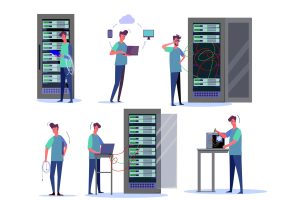How Linux Powers Modern IT Infrastructure

Linux has become a fundamental force in modern IT, driving a range of technologies from cloud systems to enterprise-level infrastructure solutions. The flexibility, scalability, and open-source nature of Linux make it a core component for modern IT systems. But how exactly does Linux power today’s infrastructure?

Stability and Reliability
Linux is known for its stability, especially in mission-critical environments. IT infrastructures that require high uptime, like web servers and data centers, rely on Linux for its ability to run continuously without crashes. The operating system’s architecture is designed to handle large-scale systems without compromising performance, making it ideal for enterprises.
Security Features
Security is paramount in IT, and Linux excels in this area. Its open-source foundation allows developers to audit and improve its security features continuously. Regular updates and a robust permission-based system make Linux less vulnerable to attacks than other operating systems. Companies that rely on secure environments for data protection and compliance turn to Linux as their primary OS.
Cloud and Virtualization Support
Linux plays a dominant role in cloud computing. Popular platforms like AWS, Google Cloud, and Microsoft Azure are built on Linux-based environments. Its compatibility with virtualization technologies like Docker and Kubernetes enables the seamless deployment of virtual machines, containers, and microservices. Through Linux Training, individuals can learn to manage these cloud environments efficiently.
Scalability
Linux is highly scalable, meaning it can be used for small embedded systems or scaled up to manage supercomputers. This flexibility allows businesses to expand their IT infrastructure without switching operating systems. Whether it’s handling a few users or millions, Linux adapts to growing demands with ease.
Cost-Effectiveness
As an open-source platform, Linux significantly reduces licensing costs for enterprises. Without the need to purchase expensive software licenses, companies can allocate their budgets to other critical areas of their infrastructure. This cost-effectiveness, coupled with the system’s efficiency, makes Linux a top choice for startups and large enterprises alike.
Developer and Enterprise Support
Linux provides a versatile environment for developers, offering extensive tools for building applications. The wide adoption of Linux in server environments also means enterprises have access to a vast array of software options, from web servers to database management systems. Learning Linux through Linux Training equips IT professionals with skills that are highly valued in the market.
Conclusion
Linux’s role in modern IT infrastructure cannot be overstated. Its ability to provide a secure, scalable, and cost-effective platform makes it the backbone of many technological innovations. For professionals looking to excel in this field, Linux Training Cyprus offers the ideal pathway to mastering this powerful operating system.



